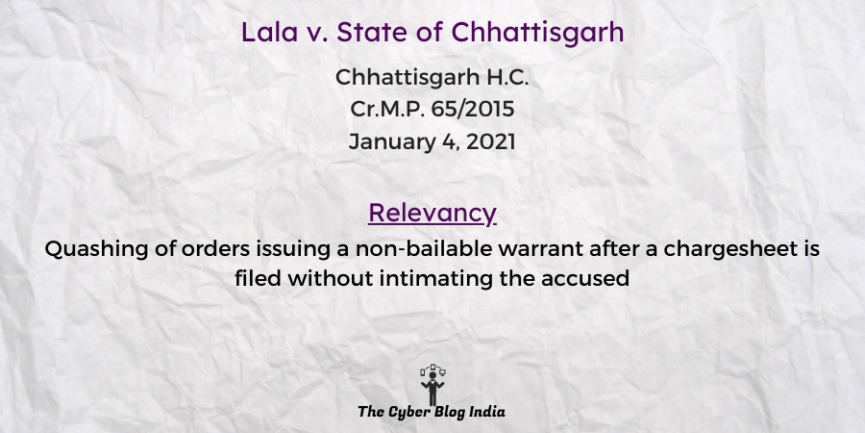Lala v. State of Chhattisgarh

Lala v. State of Chhattisgarh
(2021) 2 CGLJ 201
In the High Court of Chhattisgarh
Cr.M.P. 65/2015
Before Justice Sanjay K. Agrawal
Decided on January 4, 2021
Relevancy of the case: Quashing of orders issuing a non-bailable warrant after a chargesheet is filed without intimating the accused
Statutes and Provisions Involved
- The Information Technology Act, 2000 (Section 66(3), 67, 72)
- The Indian Penal Code, 1860 (Section 509)
- The Indecent Representation of Women (Prohibition) Act, 1986 (Section 4, 6)
- The Code of Criminal Procedure, 1973 (Section 482, 437, 436)
- The Constitution of India, 1950 (Article 21)
Relevant Facts of the Case
- A police station filed an FIR against the petitioner under Section 509 IPC, Sections 4 and 6 of the Indecent Representation of Women (Prohibition) Act, 1986 and Sections 66, 67 and 72 of the IT Act. Considering that all the offences registered against the petitioner were bailable, the police released him on a personal bond.
- The police filed a charge sheet without intimating the petitioner. The learned registered a criminal case and issued a non-bailable arrest warrant straight away. The police arrested the petitioner and produced him before the Magistrate. Subsequently, the Magistrate sent the accused to the Central Jail.
- On the same day, the petitioner filed a bail application before the learned Magistrate; however, the application was placed for consideration on the next working day. Later, the Magistrate rejected the bail application.
Prominent Arguments by the Advocates
- The petitioner’s counsel argued that not considering the bail application for a bailable offence is a violation of personal liberty. Also, on the date of filing the challan, the petitioner was already on bail. Hence, the investigation officer must have informed the petitioner about the filing of the charge sheet upon producing it.
- Furthermore, in pursuance of the arrest warrant, the petitioner immediately filed a bail application, but the learned Magistrate did not consider it on the same day. This violates his fundamental rights. When the court, in the first instance, heard the bail application, all the offences were bailable. The learned Magistrate also held that the police had incorrectly applied Section 67A in the present case.
- The respondent’s counsel submitted that the judicial order passed by both the courts is in accordance with the law.
Opinion of the Bench
- When the accused was already on bail, it was the duty of the investigating officer to inform the accused of the filing of the charge sheet. Moreover, the Supreme Court has many times condemned the straight-away filing of a non-bailable arrest warrant if it goes against reasonableness.
Final Decision
- The court set aside the original and revision orders passed by the learned Magistrate.
Julia Anna Joseph, an undergraduate student at the School of Law, Christ University, prepared this case summary during her internship with The Cyber Blog India in January/February 2022.
